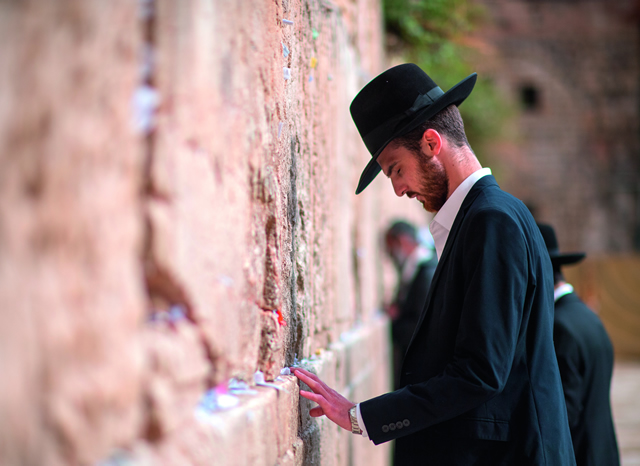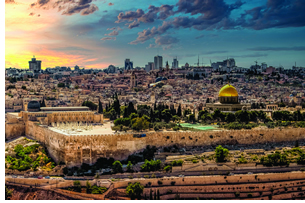
Pray for the Peace of Jerusalem! - Part 1
Psalm 122 urges us to pray for the peace of Jerusalem. What this word from God means for us today, as well as what it doesn’t.
When my family visited Israel many years ago, it was the season when storks make their way back to Europe after the winter. On the Golan we saw whole flocks of them. There are many other migratory birds that cross Israel in large flocks, stopping there for a while. But there is also another kind of flocking in Israel: people (including Christians) who travel there and then lose all sober, spiritual composure. As just one example, around 100 tourists to Jerusalem are treated every year for delusions: They suddenly believe they are a prophet, some other biblical figure like King David, or even Jesus, the Messiah.
The intemperance often begins much earlier. We once stopped by the Yardenit Baptismal Site on the Jordan, near Tiberias, where one of the many mass baptisms was taking place. After emerging, one woman began screaming as hysterically as if she were being operated on without anesthesia. My only thought was what all the other tourists and religious Jews, who were also witnessing this spectacle, must have been thinking. It makes you feel ashamed of everything that’s going on in the name of Christianity.
People can also experience strange things in other ways. Sometimes, far removed from all sense of sobriety, supporters of Christianity sing, pray, and act out in an ecstatic manner. The nation of Israel and the city of Jerusalem have a very peculiar, almost mystical effect on some people, and I say this as someone who loves Israel and Jerusalem. I love being there, because the significance of this nation and people in redemptive history is very important to me. One of the strange things I’ve noticed is that people loudly bless Israel or Jerusalem, almost like they’re repeating a mantra, but without being clear about what blessing actually means. Or the self-appointed guardians who pray as they walk along the remains of Jerusalem’s Old City walls, and believe they’re doing a very special spiritual work.
Along these lines, there’s a wide variety of shops where you can buy stickers, patches, and other souvenirs with the inscription, “Pray for Jerusalem,” “Pray for the peace of Jerusalem,” or something similar. Spiritual or religious background doesn’t seem to matter. So that we don’t likewise go into raptures, it’s important that we soberly adhere to God’s Word and continually examine ourselves in His light—and this includes praying for the peace of Jerusalem.
A BIBLICAL INVENTORY
When I use the term “biblical inventory,” I don’t mean to say that this is a comprehensive list of every Bible passage on the subject. Instead, I’ll be pointing out some basic principles.
First, we must take the earthly Jerusalem’s significance into account. I’m deliberately specifying the earthly Jerusalem—which is inseparably linked to the land and people of Israel—so that we don’t entertain the idea of confusing it with the heavenly one.
The first time we find Jerusalem mentioned in Scripture is Genesis 14:18, in connection with Melchizedek, King of Salem, who blessed Abraham. Salem is another name for Jerusalem, as we read in Psalm 76:2. The aborted sacrifice of Isaac took place on a mountain in the land of Moriah, where the temple in Jerusalem was later built (2 Chron 3:1). Second Samuel 5 tells of how David conquered Jerusalem. At the dedication of the temple in 2 Chronicles 6:6, God says that He has chosen Jerusalem as a place for His name.
Earthly Jerusalem is inseparably linked to God’s redemptive history. It is the object of His love and promises, but also the place of His judgment: Just consider the destruction of Jerusalem in 586 BC, and in 70 AD by the Romans. Jerusalem’s significance in redemptive history, extends from the Old Testament to the Millennial kingdom after Jesus’ return. Christ was crucified at Jerusalem’s gates, and the birth of the Church at Pentecost took place there. According to Zechariah 12–14, the battle for Jerusalem will trigger Jesus’ return. He will appear on the Mount of Olives to save Israel and judge the nations. Finally, in the Millennial kingdom, Jerusalem will be the city of truth from which Christ will rule. The nations will come there to worship the Lord and receive His instruction. The perfected Church will also rule with Christ in the Messianic kingdom.
 Since Jerusalem is also inseparably linked with God’s presence, His redemptive plan, and His promises, it has always had a special meaning for the Jews in diaspora. Consider Psalm 137, the lament of the people who were exiled by the rivers of Babylon: It expresses their homesickness for Zion. Daniel prayed in the direction of Jerusalem at his
Since Jerusalem is also inseparably linked with God’s presence, His redemptive plan, and His promises, it has always had a special meaning for the Jews in diaspora. Consider Psalm 137, the lament of the people who were exiled by the rivers of Babylon: It expresses their homesickness for Zion. Daniel prayed in the direction of Jerusalem at his
open window (Dan 6:10). For Nehemiah in the fifth century BC, Jerusalem was a great burden and had become the laughingstock of Israel’s enemies. Psalm 122 is thus inseparably linked to Jerusalem’s significance in redemptive history, and the promises for Israel that are associated with it.
In the Gospels, we see through Jesus both the judgment announced on Jerusalem, as well as the implied promise for Jerusalem connected with His return. Matthew 23:37-39 is representative of this:
“O Jerusalem, Jerusalem, the city that kills the prophets and stones those who are sent to it! How often would I have gathered your children together as a hen gathers her brood under her wings, and you were not willing! See, your house is left to you desolate. For I tell you, you will not see me again, until you say, ‘Blessed is he who comes in the name of the Lord.’”
In the New Testament Epistles, we find mention of the earthly Jerusalem and its future significance in Romans 9–11, the great passage on the relationship between Israel and the Church, and Israel’s future salvation. There, in Romans 11:25-27, Paul reveals another divine secret (a divine truth about salvation that had been concealed until that time). He speaks of the fact that the full number of the nations must first come in before Israel is saved. In this context, in verses 26-27, he quotes from the prophet Isaiah; namely, 59:20-21 and 27:9:
“The Deliverer will come from Zion, he will banish ungodliness from Jacob; and this will be my covenant with them when I take away their sins.”
Zion is another name for Jerusalem. Paul connects Israel’s salvation with the city. The Deliverer will come from there, as we read in Zechariah 12–14. Although prayer for Jerusalem isn’t explicitly mentioned here, Paul is pointing us in the same direction as the Old Testament prophecies.
The beginning of Romans 9 is also important in this respect. There, Paul speaks of the pain he feels for his brothers according to the flesh, the Israelites, and how he wishes for their salvation. He doesn’t base this on human attachment to their homeland, or on Israel’s role in the Old Covenant. Instead, in verses 4-5 he lists 8 privileges that Israel possesses, including the promises. He doesn’t speak of these promises in the past tense, as completed, but in the present tense. These promises for Israel are still in effect, and those that haven’t yet been fulfilled are still pending. This also includes all the future promises for earthly Jerusalem and Zion.
In the New Testament, we don’t find an explicit call to pray for Jerusalem and Israel. But the Old Testament teaches us how the faithful focused on God’s promises, and how they prayed and waited for the fulfillment. We can also see in Romans 9–11 that the issue of Jerusalem still resonates. God’s future dealings with Israel and Jerusalem aren’t something we can simply be indifferent to.
JERUSALEM BETWEEN JESUS’ FIRST AND SECOND COMINGS
Whether from the Psalms or other places, Old Testament believers knew the future promises for Israel, and Jerusalem’s significance in redemptive history. That’s why this “city of the great King” (Matt 5:35) was never regarded with apathy.
Jerusalem was also important to the Apostles, which is why they asked the Lord—shortly before His ascension—whether He would restore the kingdom to Israel at that time. Jerusalem isn’t mentioned in Acts 1:7, but it is nevertheless of central importance for the restoration of the kingdom of Israel.
In David’s prayer in Psalm 122, we find various “pre-fulfillments” from Old Testament history. For example, consider Jerusalem’s rescue from the dominion of the Assyrians at the time of the Davidic King Hezekiah. These pre-fulfillments also include the return from Babylonian exile under Zerubbabel, Ezra, and then Nehemiah, all of whom were very concerned for the welfare of Jerusalem. There were also quieter periods for Jerusalem, but these were never final. In Daniel 9:25, we read of the 62 weeks of years, in which Jerusalem’s streets and moats will be rebuilt. These 62 weeks of years began with the rebuilding of the walls under Nehemiah, and ended with the death of the Messiah, which Daniel also foretold.
Incidentally, in the middle of the first century BC, a Rabbi Nehemiah (not to be confused with the biblical Nehemiah) predicted that, based on this passage, the time of the Messiah’s coming couldn’t be more than 50 years away. Based on Daniel 9:26, Jesus’ first coming could actually be foreseen.
 Prayer for the peace of Jerusalem was also very important for the Old Testament faithful, because peace and tranquility in the city was always a sign of God’s blessing. It was an expression of His gracious care and, in the words of Numbers 6:25, the Lord’s face shining upon Israel. War and destruction, on the other hand, were always a sign of God’s judgment upon His people.
Prayer for the peace of Jerusalem was also very important for the Old Testament faithful, because peace and tranquility in the city was always a sign of God’s blessing. It was an expression of His gracious care and, in the words of Numbers 6:25, the Lord’s face shining upon Israel. War and destruction, on the other hand, were always a sign of God’s judgment upon His people.
In light of this, there is another important facet: The city of Jerusalem stands in contrast to the cities of a humanity hostile toward God. Whether Nineveh, Babylon, Tyre, Rome, or other cities, attacks on Jerusalem and its seizure show hostility toward the God of Israel and His people. Thus, a plea for the peace of Jerusalem always includes the aspect of God’s ultimate triumph.
This brings us to the matter of Jerusalem between Jesus’ first and second comings. I’ve already quoted Jesus’ lament over the city, according to which the house is left desolate (Gr. erēmos). Instead of “desolate,” it could also be translated as “waste” or “desert”—until the people say, “Blessed is he who comes in the name of the Lord!” This cry of woe relates to the coming judgment on Israel and Jerusalem, because of their disobedience and rejection of the Messiah.
Jesus’ words in Luke 21:24 are also related to this: “They will fall by the edge of the sword and be led captive among all nations, and Jerusalem will be trampled underfoot by the Gentiles, until the times of the Gentiles are fulfilled.”
The times of the Gentiles are the periods in which Jerusalem and Israel are at the mercy of the great world powers. These times began in 586/587 BC, with the destruction of Jerusalem and the temple by Nebuchadnezzar. And they will conclude with Jesus’ visible return, and the related salvation of Jerusalem and Israel. Daniel had predicted the same thing. After the death of the Messiah, the Anointed One, the sanctuary will be trampled. In other words, the temple will be destroyed, and war and devastation are decreed until the end.
New From Israel - 01/2025

